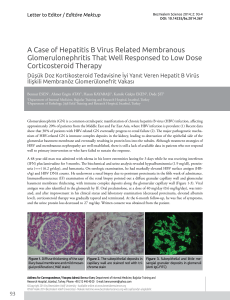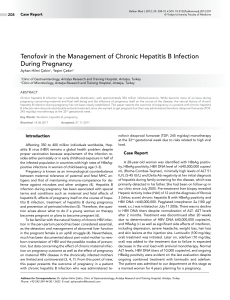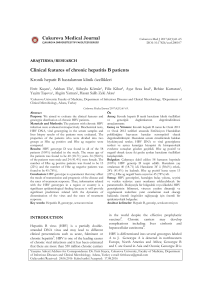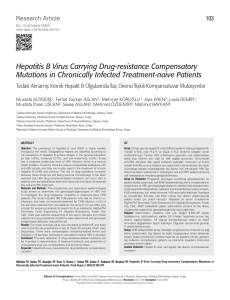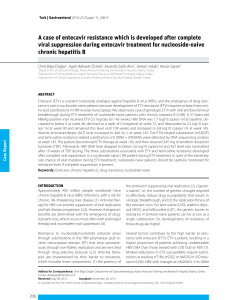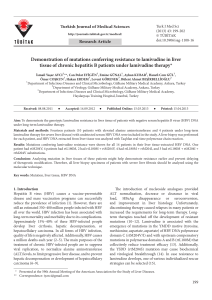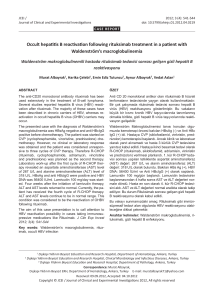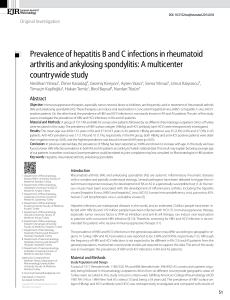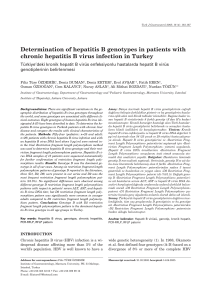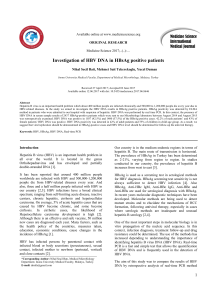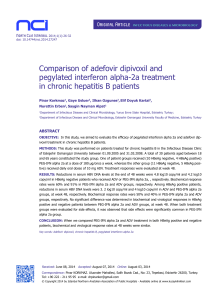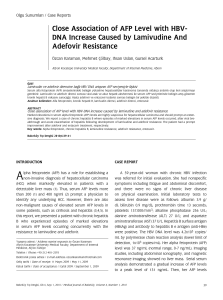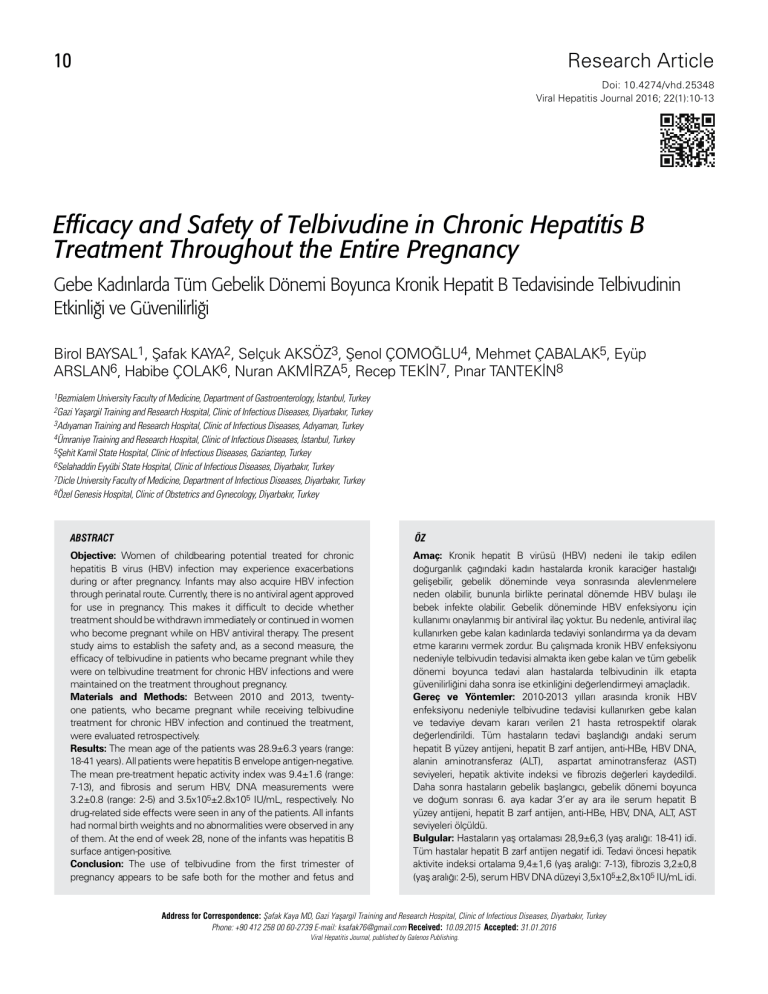
10
Research Article
Doi: 10.4274/vhd.25348
Viral Hepatitis Journal 2016; 22(1):10-13
Efficacy and Safety of Telbivudine in Chronic Hepatitis B
Treatment Throughout the Entire Pregnancy
Gebe Kadınlarda Tüm Gebelik Dönemi Boyunca Kronik Hepatit B Tedavisinde Telbivudinin
Etkinliği ve Güvenilirliği
Birol BAYSAL1, Şafak KAYA2, Selçuk AKSÖZ3, Şenol ÇOMOĞLU4, Mehmet ÇABALAK5, Eyüp
ARSLAN6, Habibe ÇOLAK6, Nuran AKMİRZA5, Recep TEKİN7, Pınar TANTEKİN8
1Bezmialem University Faculty of Medicine, Department of Gastroenterology, İstanbul, Turkey
2Gazi Yaşargil Training and Research Hospital, Clinic of Infectious Diseases, Diyarbakır, Turkey
3Adıyaman Training and Research Hospital, Clinic of Infectious Diseases, Adıyaman, Turkey
4Ümraniye Training and Research Hospital, Clinic of Infectious Diseases, İstanbul, Turkey
5Şehit Kamil State Hospital, Clinic of Infectious Diseases, Gaziantep, Turkey
6Selahaddin Eyyübi State Hospital, Clinic of Infectious Diseases, Diyarbakır, Turkey
7Dicle University Faculty of Medicine, Department of Infectious Diseases, Diyarbakır, Turkey
8Özel Genesis Hospital, Clinic of Obstetrics and Gynecology, Diyarbakır, Turkey
ABSTRACT
ÖZ
Objective: Women of childbearing potential treated for chronic
hepatitis B virus (HBV) infection may experience exacerbations
during or after pregnancy. Infants may also acquire HBV infection
through perinatal route. Currently, there is no antiviral agent approved
for use in pregnancy. This makes it difficult to decide whether
treatment should be withdrawn immediately or continued in women
who become pregnant while on HBV antiviral therapy. The present
study aims to establish the safety and, as a second measure, the
efficacy of telbivudine in patients who became pregnant while they
were on telbivudine treatment for chronic HBV infections and were
maintained on the treatment throughout pregnancy.
Materials and Methods: Between 2010 and 2013, twentyone patients, who became pregnant while receiving telbivudine
treatment for chronic HBV infection and continued the treatment,
were evaluated retrospectively.
Results: The mean age of the patients was 28.9±6.3 years (range:
18-41 years). All patients were hepatitis B envelope antigen-negative.
The mean pre-treatment hepatic activity index was 9.4±1.6 (range:
7-13), and fibrosis and serum HBV, DNA measurements were
3.2±0.8 (range: 2-5) and 3.5x105±2.8x105 IU/mL, respectively. No
drug-related side effects were seen in any of the patients. All infants
had normal birth weights and no abnormalities were observed in any
of them. At the end of week 28, none of the infants was hepatitis B
surface antigen-positive.
Conclusion: The use of telbivudine from the first trimester of
pregnancy appears to be safe both for the mother and fetus and
Amaç: Kronik hepatit B virüsü (HBV) nedeni ile takip edilen
doğurganlık çağındaki kadın hastalarda kronik karaciğer hastalığı
gelişebilir, gebelik döneminde veya sonrasında alevlenmelere
neden olabilir, bununla birlikte perinatal dönemde HBV bulaşı ile
bebek infekte olabilir. Gebelik döneminde HBV enfeksiyonu için
kullanımı onaylanmış bir antiviral ilaç yoktur. Bu nedenle, antiviral ilaç
kullanırken gebe kalan kadınlarda tedaviyi sonlandırma ya da devam
etme kararını vermek zordur. Bu çalışmada kronik HBV enfeksiyonu
nedeniyle telbivudin tedavisi almakta iken gebe kalan ve tüm gebelik
dönemi boyunca tedavi alan hastalarda telbivudinin ilk etapta
güvenilirliğini daha sonra ise etkinliğini değerlendirmeyi amaçladık.
Gereç ve Yöntemler: 2010-2013 yılları arasında kronik HBV
enfeksiyonu nedeniyle telbivudine tedavisi kullanırken gebe kalan
ve tedaviye devam kararı verilen 21 hasta retrospektif olarak
değerlendirildi. Tüm hastaların tedavi başlandığı andaki serum
hepatit B yüzey antijeni, hepatit B zarf antijen, anti-HBe, HBV DNA,
alanin aminotransferaz (ALT), aspartat aminotransferaz (AST)
seviyeleri, hepatik aktivite indeksi ve fibrozis değerleri kaydedildi.
Daha sonra hastaların gebelik başlangıcı, gebelik dönemi boyunca
ve doğum sonrası 6. aya kadar 3’er ay ara ile serum hepatit B
yüzey antijeni, hepatit B zarf antijen, anti-HBe, HBV, DNA, ALT, AST
seviyeleri ölçüldü.
Bulgular: Hastaların yaş ortalaması 28,9±6,3 (yaş aralığı: 18-41) idi.
Tüm hastalar hepatit B zarf antijen negatif idi. Tedavi öncesi hepatik
aktivite indeksi ortalama 9,4±1,6 (yaş aralığı: 7-13), fibrozis 3,2±0,8
(yaş aralığı: 2-5), serum HBV DNA düzeyi 3,5x105±2,8x105 IU/mL idi.
Ad­dress for Cor­res­pon­den­ce: Şafak Kaya MD, Gazi Yaşargil Training and Research Hospital, Clinic of Infectious Diseases, Diyarbakır, Turkey
Phone: +90 412 258 00 60-2739 E-mail: [email protected] Re­cei­ved: 10.09.2015 Ac­cep­ted: 31.01.2016
Viral Hepatitis Journal, pub­lis­hed by Ga­le­nos Pub­lis­hing.
Baysal et al.
Telbivudine in Pregnant Women
to be efficient in preventing mother-to-child transmission of HBV
infection. However, randomized, controlled studies involving a
higher number of subjects are needed.
Keywords: Pregnancy, chronic hepatitis B, treatment, telbivudine
Introduction
About 350-400 million people worldwide are hepatitis
B virus (HBV) carriers and about 1 million people die each
year due to HBV-related complications (1). The prevalence
of HBV infection varies by geographic region. Our country is
in a intermediate-endemic area with a carrier rate of 2-10%
(2). Transmission from mother to infant becomes a more
important issue with increasing endemicity (3). Perinatal
transmission is associated with a higher risk for chronic
condition and occurrence of complications including cirrhosis
and hepatic cancer (4). Therefore, it is important to prevent HBV
transmission from mother to infant. Although pregnant women
are screened for HBV and infants born to HBV-positive mothers
are routinely vaccinated and given immunoglobulin, perinatal
transmission may be an issue especially in pregnant women
with a high level of viremia (5). Mothers may also experience
exacerbations of chronic hepatitis B during or after pregnancy.
Acute exacerbations of chronic HBV infection may have a
severe course and may be associated with fatality rates of
20-30% (4,6). In pregnant women, who already started antiviral
treatment, the treatment should be maintained if liver biopsy
demonstrates advanced fibrosis as withdrawal of treatment
may result in exacerbations (7).
There is currently no antiviral agent approved for the treatment
of chronic HBV infection in pregnancy. This makes it difficult
to decide whether the treatment should be discontinued or
maintained in women who become pregnant while receiving an
antiviral agent. The health of both the mother and infant should
be taken into consideration when making this decision. The major
concern for the fetus is drug exposure during embryogenesis,
while the primary issue for the mother involves the risk of
disease exacerbation and progression because treatment cannot
be initiated or should be discontinued due to pregnancy. This
effect on the health of the mother may also affect the health of
the fetus and the lives of both the mother and the fetus may be
compromised (8). Of the nucleoside and nucleotide analogues
that are being widely used for chronic HBV infection, lamivudine,
adefovir and entecavir are assigned to category C and telbivudine
and tenofovir category B by the Food and Drug Administration
(FDA) (8). Telbivudine is an oral nucleoside analogue and is one of
the two agents that can be used in pregnancy. Clinical experience,
however, is quite limited (9). There are a few studies in the literature
on the efficacy and safety of its use particularly throughout the
whole pregnancy. In the present study, we aimed to investigate
11
Hastaların hiçbirinde ilaca bağlı yan etki görülmedi. İnfantların hepsi
normal doğum ağırlığına sahipti ve hiçbirinde anomali saptanmadı.
Ayrıca 28. haftanın sonunda infantların hiçbirinde hepatit B yüzey
antijen pozitifliği mevcut değildi.
Sonuç: Telbivudinin gebeliğin ilk trimesterinden itibaren kullanımı,
hem anne hem fetus açısından güvenli, anneden infanta HBV
geçişini önlemede de etkin görünmektedir. Bununla birlikte hasta
sayısının daha fazla olduğu randomize kontrollü çalışmalara ihtiyaç
vardır.
Anahtar Kelimeler: Gebelik, kronik hepatit B, tedavi, telbivudin
the safety and, as a second measure, the efficacy of telbivudine
in patients who became pregnant while they were on telbivudine
treatment for chronic HBV infection and were maintained on the
treatment throughout pregnancy.
Materials and Methods
This is a retrospective study performed with the participation
of five hospitals from Turkey. A standard questionnaire was sent to
each hospital participating in this study and the data were collected
via a computerized database. Pregnant women receiving antiviral
therapy and their partners were contacted with and, based on
their prior treatment experiences, hepatitis B envelope antigen
(HBeAg) status, HBV DNA values and fibrosis values with hepatic
biopsy results, they were informed about the possible risks to
the mother and the infant should the treatment is withdrawn or
continued. Patients who were maintained on treatment underwent
periodic checks by an obstetrician. Approval of the relevant ethics
committee was received.
Patients
Medical files of 256 patients, who were examined for chronic
HBV infection and received telbivudine treatment between 2010
and 2013, were reviewed. Twenty-one patients, who became
pregnant while on telbivudine and decided to remain on treatment,
were included in this study. The inclusion criteria were as follows;
1) The patient should have started telbivudine treatment before
becoming pregnant and continued therapy throughout pregnancy,
2) Should have no other underlying condition,
3) Should be negative for human immunodeficiency virus,
hepatitis C virus and hepatitis D virus. All patients were reviewed
for toxoplasmosis, syphilis, rubella, herpes, and cytomegalovirus
and, these diseases were excluded. All patients were given
folic acid over the first trimester. Routine screening tests for
phenylketonuria and hypothyroidism were also performed for all
infants.
Data were retrieved by reviewing patient files retrospectively.
Baseline serum HBsAg, HBeAg, anti-HBe, HBV DNA, alanine
aminotransferase (ALT), aspartate aminotransferase (AST) levels,
hepatic activity index and fibrosis values were recorded for each
patient. Further serum HBsAg, HBeAg, anti-HBe, HBV DNA, ALT,
and AST measurements were performed at pregnancy onset,
during and following pregnancy every 3 months up to post-natal
month 6. In addition, all fetuses were monitored for abnormalities
periodically throughout the intrauterine phase. To prevent chronic
HBV infection, all infants were given 100 IU of intramuscular
12
Baysal et al.
Telbivudine in Pregnant Women
hepatitis B immunoglobulin (HBIG, HyperHEP B solvent/detergent
treated; Talecris Biotherapeutic, NC, United States) and 10 mcg
of intramuscular hepatitis B (Recombivax HB; Merck Sharp and
Dohme, NJ, United States) vaccines according to the relevant
guidelines. Further doses of hepatitis B vaccine, one at week 4
and another at week 24, were administered. At the end of week
28, all infants were evaluated for HBsAg, anti-HBs and HBV DNA.
In addition, all infants were monitored for any abnormalities and
growth retardation for one year.
Laboratory Tests
HBV DNA was quantified using the Roche COBAS Amplicor
HBV monitor assay which has a low limit of detection (LLD)
of 500 copies/mL (Roche Molecular Diagnostics, Branchburg,
NJ, United States). This assay was later replaced by the Roche
COBAS TaqMan HBV test with a LLD of 50 copies/mL (Roche
Molecular Diagnostics). HBV serological markers were detected
by enzyme-linked immunosorbent assay kits on an Advia Centaur
XP chemiluminescence immunoassay instrument (Siemens,
Germany) according to the manufacturer’s instructions.
Statistical Analysis
Statistical analysis was performed using Statistical Package for
Social Sciences 19 (Computer Resource Center, Chicago, IL, United
States). Measurement data were expressed as mean±standard
deviation.
Results
The mean age of the 21 patients who became pregnant while
receiving telbivudine for chronic HBV infection was 28.9±6.3 years
(range: 18-41 years). In 8 patients (38.1%), at least one of the previous
births was HBsAg-positive. All patients were HBeAg-negative. With
pre-treatment measurements, hepatic activity index was 9.4±1.6
(range: 7-13), fibrosis was 3.2±0.8 (range: 2-5) and serum HBV
DNA was 3.5x105±2.8x105 IU/mL. ALT, AST, and HBV DNA values
measured before treatment, at pregnancy onset and at later time
points are provided in Table 1. None of the patients had abortion. Two
of them developed urinary tract infection after the sixth month of
pregnancy. None of them experienced drug-associated side effects.
Triple screening test performed over the course of the pregnancy
demonstrated risk for only one mother, with the test performed
at month 4, for which amniocentesis was performed, revealing no
pathology. All of the infants were of normal birth weight (2700-3800
g) and none had phenylketonuria, hypothyroidism or malformations.
At the end of week 28, none of the infants were HBsAg-positive.
Only two infants had anti-HBs <100 mIU/mL, while the remaining 19
infants had anti-HBs levels above 100 mIU/L.
Discussion
The primary route of HBV transmission is via blood and skin and/
or mucosal exposure to bodily fluids, but HBV is also present in the
amniotic fluid, breast milk, vaginal secretions and cord blood (10).
Perinatal transmission of HBV may be associated with significant rates
of chronic infection and complications related to this infection, including
cirrhosis and hepatocellular cancer (8). The prevalence of chronic HBV
in pregnant women is 0.6% in low endemic areas and over 20% in
high endemic areas (8,10). Studies from our country have reported
HBsAg positivity rates of 2.1 to 12.3% among pregnant women
(11,12,13,14). A woman of childbearing age infected with chronic HBV
infection may develop chronic hepatic disease (fibrosis and/or cirrhosis)
and may experience exacerbations during and following pregnancy
and, furthermore, the infant may be infected via HBV transmission
during the perinatal period. There is no conclusive information on the
potential problems due to antiviral therapy in early pregnancy. However,
if a patient has advanced fibrosis or elevated ALT levels, it may become
necessary following a risk-benefit assessment to initiate treatment
and to maintain the therapy throughout pregnancy (6,8,14). The FDA
has defined risk categories regarding the use of medicines during
pregnancy. Accordingly, telbivudine, an agent used in chronic HBV
infection treatment, is included in the pregnancy category B (15). There
are several studies in the literature on the use of telbivudine during
pregnancy. However, most of these reports concern patients treated
with telbivudine during the second or third trimesters of pregnancy to
prevent transmission of HBV from the mothers with high viral load to
their infants (16,17,18,19). To the best of our knowledge, there have
been a very few reports on the safe use of telbivudine throughout the
whole pregnancy, beginning from the first trimester (9,20). Treatment
is challenging in women of childbearing potential. Given the 48-week
treatment duration, interferons may be considered as the first choice
if pregnancy is not being planned for the near future in these women.
Problems are being encountered when deciding whether oral antiviral
treatment should be started in situations where the women intent to
become pregnant soon, have advanced hepatic disease and treatment
delay would be risky. In case oral antiviral treatment has been initiated,
the increased risk of mortality for both the mother and the infant due
to possible acute chronic HBV infection exacerbation if the treatment
is withdrawn when the patient becomes pregnant, presents another
challenge. The present study examined the safe use of telbivudine
throughout the whole pregnancy beginning from the first trimester
during which embryogenesis takes place. A total of 21 patients who
became pregnant while receiving telbivudine were evaluated in the
study. Benefit to risk ratio was discussed with each individual patient
since they all had advanced hepatic disease. An obstetrician also
participated in the monitoring of patients who were maintained on
Table 1. Maternal laboratory investigation outcome
Maternal outcomes
Pre-treatment
period
The beginning of pregnancy
6th month of pregnancy
Postpartum 3rd month
Postpartum 6
month
HBV DNA, (IU/mL)
3.5x105
Negative
Negative
Negative
Negative
ALT, (IU/L)
46.1
30.9
28.6
25.7
26.7
AST, (IU/L)
40.7
27.7
24
22.9
21.9
HBV: Hepatitis B virus, ALT: Alanine aminotransferase, AST: Aspartate aminotransferase
Baysal et al.
Telbivudine in Pregnant Women
treatment. The mothers did not develop hepatic disease exacerbations
throughout pregnancy and over the postpartum period and no side
effects were observed. Congenital abnormalities were not observed
in infants of the mothers treated with telbivudine. Maternal HBV
transmission did not occur.
Conclusion
In conclusion, the use of telbivudine since the first trimester of
pregnancy appears to be safe both for the mother and fetus and
efficient in preventing HBV transmission from the mother to the
infant. However, randomized, controlled studies involving a higher
number of subjects are needed.
Ethics
Peer-review: Internal peer-reviewed.
Authorship Contributions
Surgical and Medical Practices: Şafak Kaya, Selçuk Aksöz,
Mehmet Cabalak, Eyüp Arslan, Şenol Comoğlu, Pınar Tantekin,
Concept: Birol Baysal, Şafak Kaya, Design: Habibe Çolak, Recep
Tekin, Data Collection or Processing: Birol Baysal, Şafak Kaya,
Analysis or Interpretation: Birol Baysal, Şafak Kaya, Literature
Search: Nuran Akmirza, Birol Baysal, Şafak Kaya, Writing: Birol
Baysal, Şafak Kaya
Conflict of Interest: No conflict of interest was declared by the
authors.
Financial Disclosure: The authors declared that this study
received no financial support.
Baysal B, Kaya Ş, Aksöz S, Çomoğlu Ş, Çabalak M, Arslan E,
Çolak H, Akmirza N, Tekin R, Tantekin P. Efficacy and Safety of
Telbivudine in Chronic Hepatitis B Treatment Throughout the Entire
Pregnancy. Viral Hepatitis J 2016;22:10-13.
References
1. Dienstag JL. Chronic Viral Hepatitis. In: Mandell GL, Bennett
JE, Dolin R (eds). Mandell, Douglas, and Bennett’s Principles
and Practise of Infectious Diseases. 6th ed. Philadelphia:
Churchill Livingstone; 2005; p.1441-1464.
2. Demir İ, Kaya S, Demirci M, Arıdoğan BC. Investigation of
seropositivity of hepatitis B virus in healthworkers in Isparta,
Turkey. Turkish J of Infect. 2006;20:183-187.
3. Jonas MM. Hepatitis B and pregnancy: an underestimated
issue. Liver Int. 2009;29(Suppl 1):133-139.
4. Yogeswaran K, Fung SK. Chronic hepatitis B in pregnancy:
unique challenges and opportunities. Korean J Hepatol.
2011;17:1-8.
13
5. Pan CQ, Duan ZP, Bhamidimarri KR, Zou HB, Liang XF, Li J,
Tong MJ. An algorithm for risk assessment and intervention
of mother to child transmission of hepatitis B virus. Clin
Gastroenterol Hepatol. 2012;10:452-459.
6. Degli Esposti S, Shah D. Hepatitis B in pregnancy: challenges
and treatment. Gastroenterol Clin North Am. 2011;40:355-372.
7. Bzowej NH. Optimal management of the hepatitis B patient
who desires pregnancy or is pregnant. Curr Hepat Rep.
2012;11:82-89.
8.Petersen J. HBV treatment and pregnancy. J
Hepat.
2011;55:1171-1173.
9. Mohan AT, Hariharan M. Efficacy and safety of telbivudine
during pregnancy in a patient with HBeAg-Negative chronic
Hepatitis B. Hep B Annual. 2009;6:157-162.
10.Petrova M, Kamburov V. Breastfeeding and chronic HBV
infection: clinical and social implications. World J Gastroenterol.
2010;16:5042-5046.
11.Karaca C, Karaca N, Usta T. The incidence of hepatitis B, C,
D virus infection in pregnant population and rate of perinatal
transmission of the hepatitis C virus. Turkish Academic J
Gastroenterol. 2003;2:122-124.
12.Kölgeliler S, Demir LS, Demir NA, Özçimen S, Tabak S.
Seropositivity of HBsAg and anti-HCV in Pregnant Women in
Adıyaman. Viral Hepat J. 2012;18:98-101.
13.Madendag Y, Madendag IC, Çelen S, Unlu S, Danışman N.
Seroprevalence of hepatitis B, hepatitis C and HIV at whole
obstetric and gynecologic patients who applıed our hospital.
Turkiye Klinikleri Clinical J Gynecol Obst. 2007;17:442-446.
14.Borgia G, Carleo MA, Gaeta GB, Gentile I. Hepatitis B in
pregnancy. World J Gastroenterol. 2012;18:4677-4683.
15.Tran TT. Management of hepatitis B in pregnancy: weighing the
options. Cleve Clin J Med. 2009;76(Suppl 3):25-29.
16.Liu MH, Sheng YJ, Liu JY, Hu HD, Zhang QF, Ren H. Efficacy
of telbivudine on interruption of hepatitis B virus vertical
transmission: a meta-analysis. Ann Saudi Med. 2013;33:169176.
17.Deng M, Zhou X, Gao S, Yang SG, Wang B, Chen HZ, Ruan
B. The effects of telbivudine in late pregnancy to prevent
intrauterine transmission of the hepatitis B virus: a systematic
review and meta-analysis. Virol J. 2012;9:185.
18.Pan CQ, Han GR, Jiang HX, Zhao W, Cao MK, Wang CM,
Yue X, Wang GJ. Telbivudine prevents vertical transmission
from HBeAg-positive women with chronic hepatitis B. Clin
Gastroenterol Hepatol. 2012;10:520-526.
19.Wu Q, Huang H, Sun X, Pan M, He Y, Tan S, Zeng Y, Li L, Deng
G, Yan Z, He D, Li J, Wang Y. Telbivudine prevents vertical
transmission of hepatitis B virus from women high viral loads:
a prospective long-term study. Clin Gastroenterol Hepatol.
2015:13:1170-1176.
20.Liu M, Cai H, Yi W. Safety of telbivudine treatment for
chronic hepatitis B for the entire pregnancy. J Viral Hepat.
2013;20(Suppl 1):65-70.

